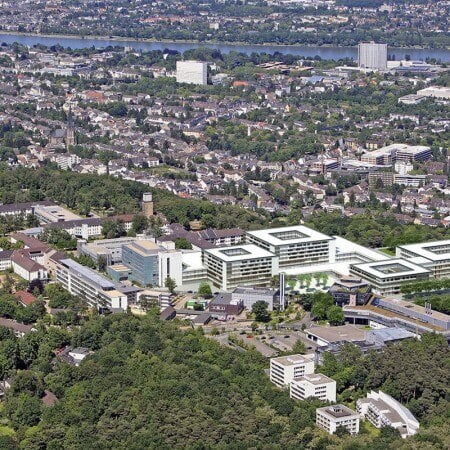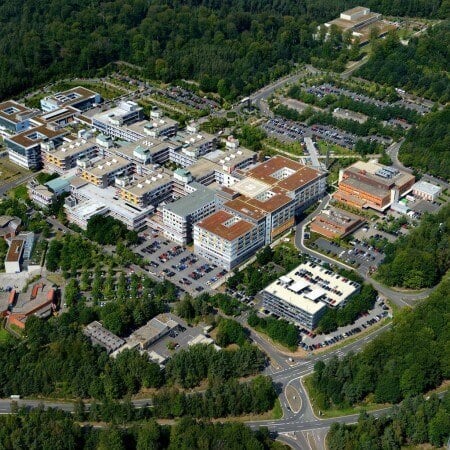Hospitals for Lung Cancer Treatment
Each hospital in this list meets Booking Health’s strict international standards: at least 250 surgeries per year, ISO‑certified quality management, and documented survival outcomes. Our medical board then ranks the clinics by clinical expertise, technology, and patient‑satisfaction scores.

According to the authoritative Focus magazine, the University Hospital Bonn ranks among the top ten medical facilities in Germany! The hospital was opened on January 1, 2001, although in fact it inherits the medical facility, which operated at the Faculty of Medicine of the University of Bonn. The hospital in Germany combin









Diagnosis of lung cancer
Price from:
9248.63
Go to the program Thoracotomy by lung cancer with segmental resection
Price from:
31238.2
Go to the program Treatment of lung cancer by radiation therapy
Price from:
26337.48
Go to the program Treatment of lung cancer with chemotherapy
Price from:
9250.92
Go to the program Treatment of lung cancer with lobectomy and extended pneumonectomy
Price from:
42381.77
Go to the program Treatment of neuroendocrine tumor (NET) of the lung with chemotherapy
Price from:
9571.32
Go to the program Treatment of neuroendocrine tumor (NET) of the lung with Lutetium-177-DOTATATE
Price from:
19371.79
Go to the program 
According to the Focus magazine, the University Hospital of Ludwig Maximilian University of Munich is regularly ranked among the best medical institutions in Germany! The hospital is the largest multidisciplinary medical facility, as well as a leading research and training center in Germany and Europe. The hospital is proud of i





Diagnosis of lung cancer
Price from:
9097.03
Go to the program Treatment of lung cancer with embolization of bleeding vesseles
Price from:
11282.44
Go to the program Thoracotomy by lung cancer with segmental resection
Price from:
31223.28
Go to the program Thoracotomy by lung cancer with segmental resection
Price from:
31518.42
Go to the program Treatment of lung cancer with chemotherapy
Price from:
9268.15
Go to the program Treatment of lung cancer with embolization or chemoembolization
Price from:
33402.43
Go to the program Treatment of lung cancer with lobectomy and extended pneumonectomy
Price from:
42332.39
Go to the program Treatment of lung cancer with lobectomy and extended pneumonectomy
Price from:
41889.11
Go to the program Treatment of neuroendocrine tumor (NET) of the lung with chemotherapy
Price from:
9202.69
Go to the program Treatment of neuroendocrine tumor (NET) of the lung with embolization or chemoembolization
Price from:
33667.71
Go to the program Treatment of neuroendocrine tumor (NET) of the lung with Lutetium-177-DOTATATE
Price from:
19289.1
Go to the program 
The University Hospital Marburg UKGM offers patients modern diagnostics and comprehensive therapy at the international level. As a maximum care hospital, the medical facility specializes in all fields of modern medicine ranging from ophthalmology to traumatology and dentistry. The main areas of specialization of the hospital are





Diagnosis of lung cancer
Price from:
8000.31
Go to the program Treatment of lung cancer with embolization of bleeding vesseles
Price from:
9779.19
Go to the program Thoracotomy by lung cancer with segmental resection
Price from:
25800.53
Go to the program Treatment of lung cancer by radiation therapy
Price from:
31652.27
Go to the program Treatment of lung cancer with chemotherapy
Price from:
8034.76
Go to the program Treatment of lung cancer with embolization or chemoembolization
Price from:
27939.49
Go to the program Treatment of lung cancer with lobectomy and extended pneumonectomy
Price from:
34820.71
Go to the program Treatment of neuroendocrine tumor (NET) of the lung with chemotherapy
Price from:
7954.38
Go to the program Treatment of neuroendocrine tumor (NET) of the lung with embolization or chemoembolization
Price from:
28034.81
Go to the program 

